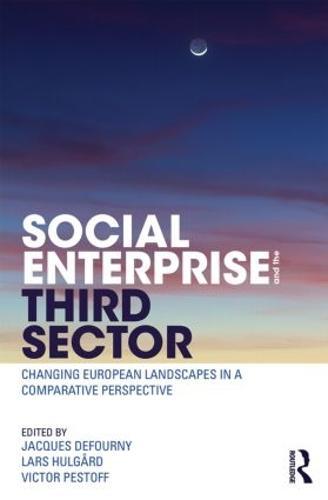Full Product Details
Author: Jacques Defourny ,
Lars Hulgård (Roskild University, Denmark) ,
Victor Pestoff
Publisher: Taylor & Francis Ltd
Imprint: Routledge
Dimensions:
Width: 15.60cm
, Height: 2.30cm
, Length: 23.40cm
Weight: 0.430kg
ISBN: 9780415831567
ISBN 10: 0415831563
Pages: 280
Publication Date: 10 June 2014
Audience:
General/trade
,
College/higher education
,
General
,
Tertiary & Higher Education
Format: Paperback
Publisher's Status: Active
Availability: In Print

This item will be ordered in for you from one of our suppliers. Upon receipt, we will promptly dispatch it out to you. For in store availability, please contact us.
Reviews
`Defourny and colleagues latest book is an important contribution to our understanding of the origins, growth and prospects for the social economy in Europe. Leading scholars blend established and novel theoretical perspectives with new data to place social enterprise and the third sector at the centre of future research, practice and policy debates.' - Dr Helen Haugh, Senior Lecturer in Community Enterprise, Judge Business School, University of Cambridge, UK `Social enterprise has become a key dimension of development within the European third sector in the 21st century. It is both a noun, describing new forms of organization within the sector, and a verb, describing new forms of activity within organizations. The editors have assembled contributors comprising the leading scholars in this new field from across the EU. Drawing on the research co-ordinated by the EMES Network, their contributions explore some of the key theoretical and empirical challenges for third sector development posed by the impact of social enterprise.' - Pete Alcock, Professor of Social Policy and Administration, Third Sector Research Centre, University of Birmingham, UK `This timely book locates the EMES approach to social enterprise within the global context, with a particular focus on the governance of social enterprise and the third sector as a means of governance. The book outlines complex concepts clearly and will be of use to a wide range of audiences. Its main contribution is that critics can no longer argue that the social enterprise field is dominated by a lack of rigorous definitions and of conceptual clarity' - Simon Teasdale, Senior Lecturer, Yunus Centre for Social Business and Health, Glasgow Caledonian University, UK `This book places social enterprise, too often presented as an isolated, almost miraculous phenomenon, firmly within its political, economic and social context. Full of fresh insight and disruptive thinking, it will be of interest to academics and students alike.' - Andy Brady, Course Leader, BA in Charity and Social Enterprise Management, Anglia Ruskin University, UK
'Social enterprise has become a key dimension of development within the European third sector in the 21st century. It is both a noun, describing new forms of organization within the sector, and a verb, describing new forms of activity within organizations. The editors have assembled contributors comprising the leading scholars in this new field from across the EU. Drawing on the research co-ordinated by the EMES Network, their contributions explore some of the key theoretical and empirical challenges for third sector development posed by the impact of social enterprise.' - Pete Alcock, Professor of Social Policy and Administration, Third Sector Research Centre, University of Birmingham, UK
Author Information
Jacques Defourny is professor of third sector economics at HEC Management School, University of Liege (Belgium) where he is also a director of the Centre for Social Economy. He was a founding coordinator (1996-2001) and then the first president (2002-2010) of the EMES European Research Network. His work focuses on comparisons of social enterprise models across the world and on conceptual and quantitative analysis of the third sector both in developed as well as developing countries Lars Hulgård is professor of social entrepreneurship at Roskilde University (RUC), Denmark. He has been the president of the EMES International Research Network since 2010, and is the chair of the research group Social Innovation and Organizational Learning. He is the founder and co-director of the Centre for Social Entrepreneurship and his research interests are on the relation between civil society, the third sector and social entrepreneurship as well as the role of social enterprise in the transition of the welfare state Victor Pestoff is a professor at the Institute for Civil Society Studies, Ersta Sköndal University College in Stockholm, Sweden. His research focuses on the political impact of third sector organizations and cooperatives and he has published more than a dozen books on such topics. He is also a founding member of the EMES International Research Network




